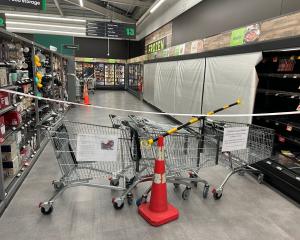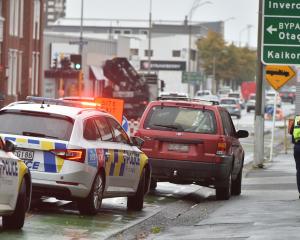A Queenstown couple, who were stopped by security guards from taking an insulin pen into last week's All Blacks-Fiji test match at Carisbrook because it was a "dangerous weapon", are concerned others might be prevented from taking life-saving medication to rugby games.
Rugby authorities said the incident appeared to be a case of over-zealous security guards thinking they were doing right.
The action was not policy and would not be during the Rugby World Cup.
Queenstown real estate agent Beth Chisholm said she kept the insulin pen and a blood tester in her handbag for her husband Steve, a type-1 diabetic; and "never, ever" went anywhere without it.
The couple had been to many games at Carisbrook and never had an issue with the insulin pen, which was discovered last Friday when security checked Mrs Chisholm's handbag.
When she stressed the importance of having the medication at hand at all times, she was told by the security guards her husband "needed to eat prior to the game", that there would be first-aid posts within the venue which would have insulin, and that the couple should always carry sweets in case the diabetic had a "low".
They took the insulin pen to their car, but during the game Mrs Chisholm checked at a St John first-aid post to see if it had the insulin her husband needed. It did not.
"This is of great concern to us, not only for other insulin-dependent diabetics, but also those people who need to carry Epi-pens for allergic reactions. It is not always easy to find a first-aid post when you only have a short timeframe in order to administer medication."
Dunedin diabetes specialist Prof Jim Mann said yesterday it was "ridiculous" someone should not be allowed to take their insulin pen into a rugby match.
"In my 35 years, or more, as a specialist in the area of diabetes, I have never heard anything so ludicrous," he said.
A St John spokeswoman said qualified staff working at matches did have medication for administering in cases of diabetic lows.
St John was unaware people were not allowed to bring insulin pens into venues, she said.
Rugby authorities were also surprised to hear of the incident.
Otago Rugby Football Union general manager Richard Reid described it as "very unfortunate" and said the issue of security processes would be included in a general review of the test match.
The union provided the security as part of its contract with the New Zealand Rugby Union to host the test in Dunedin, he said.
Before the match it was agreed with RWC organisers that the RWC security company, ADT Armourguard, would operate under RWC rules, as a practice run for the upcoming tournament.
He did not know what specific rules the security company followed in determining what was a weapon, but would be surprised if an insulin pen was considered one.
ADT Armourguard referred all queries to Mr Reid.
The Chisholms' experience was "very odd", Mr Reid said.
He hoped guards would check with superiors when a ticket holder said a needle was for insulin, and he was concerned security staff appeared to be advising people they did not need insulin because it was available on the grounds.
"Clearly, these things are never deliberate.
"We don't set out to deliberately upset people, but from time to time we do have issues with people working at games and we apologise about that."
If the Chisholms wanted to contact him, the union was more than happy to have them as its guests at next month's Otago-Southland game, he said.
NZRU's general manager of public affairs, Nick Brown, said it was not the union's policy to stop people taking insulin pens to games.
A RWC spokesman said this appeared to be a case of an "over-zealous individual" trying to do the right thing, but getting it wrong.
The health and safety of all its fans was a priority for Rugby New Zealand Ltd, and certainly people who needed medication with them at all times should be able to take it into the ground, he said.












